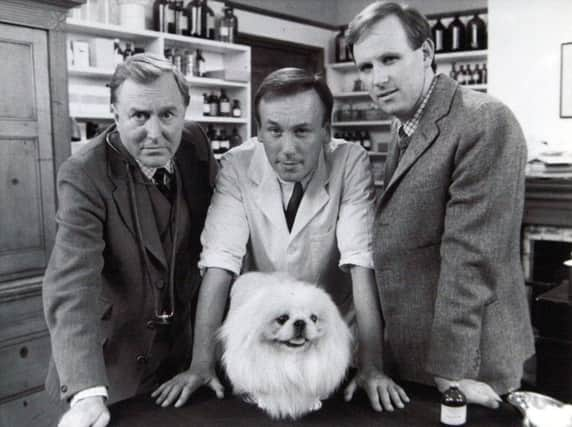From Harry Potter to a Yorkshire vet... the remarkable career of Robert Hardy


The actor, who died yesterday at 91, was in the 1980s a familiar face in almost every household, as the cantankerous Siegfried Farnon in All Creatures Great and Small, the TV version of Alf Wight’s stories about a fictitious Yorkshire vet.
The nostalgic and good-natured stories were among the best-loved of their era. But the Oxford-educated Hardy, who starred alongside Christopher Timothy and Peter Davison, was equally at home as Churchill, in Harry Potter, and - having found a pair in the family’s attic as a boy - demonstrating the use of the traditional English longbow.
Advertisement
Hide AdAdvertisement
Hide AdTwo years ago, when Westminster Abbey marked the 600th anniversary of the Battle of Agincourt, it was he who read from Henry V.
With a trademark twinkle in his eye, he could carry off the lightest roles, and the darkest.
Among the former was Cornelius Fudge, the Minister for Magic, in several of the Harry Potter films, a part he left only after the production company reportedly declined to pay the £1m life insurance premium his advancing age commanded.
One of his co-stars, Chris Rankin, who played Percy Weasley, said he was “terribly sad” to hear the news of Hardy’s death. “He was a very kind man who told wonderful stories,” he said.
Advertisement
Hide AdAdvertisement
Hide AdHardy was a memorable Churchill, in two major TV productions, three decades apart - The Wilderness Years and 100 Days That Saved Britain.
Last night, his children Emma, Justine and Paul, remembered him as “a meticulous linguist, a fine artist, a lover of music and a champion of literature, as well as a highly respected historian, and a leading specialist on the longbow”.
He was also an essential part of the team that raised the great Tudor warship, the Mary Rose, they added, a point echoed by the Mary Rose Museum in Portsmouth. He had been one of their strongest supporters, they said. “We’re very appreciative of all the work he has done for us.”
Originally from Cheltenham, Hardy went up to Magdalen College, Oxford, where his tutors included JRR Tolkien and CS Lewis. His studies were interrupted by service in the RAF but he returned to gain an English degree he would later refer to as “shabby”.
Advertisement
Hide AdAdvertisement
Hide AdHe began acting with what was then the Shakespeare Memorial Company - later the Royal Shakespeare Company - in Stratford, in 1949, and continued treading the boards for most of the rest of his life.
In 1958 he ventured into cinema, as a naval officer in Torpedo Run, and seven years later was reunited with his university friend Richard Burton in The Spy Who Came In From The Cold.
But it was TV that was to give him his greatest fame, and a year after that film he won his first continuing role - that of the cut-throat businessman Alex Stewart, in the BBC series, The Troubleshooters.
A cameo in the finale of Upstairs, Downstairs as the wealthy and influential bachelor Sir Guy Paynter followed before he landed the plum role of Siegfried Farnon in his signature series. At its peak it attracted audiences of around 20m.
Advertisement
Hide AdAdvertisement
Hide AdHardy was married and divorced twice. His first wife was Elizabeth Fox, the daughter of Sir Lionel Fox, in 1952. A son, Paul Hardy, followed before the marriage ended after four years. In 1961 he married Sally Pearson, a union that lasted 20 years.
X-ref Comment